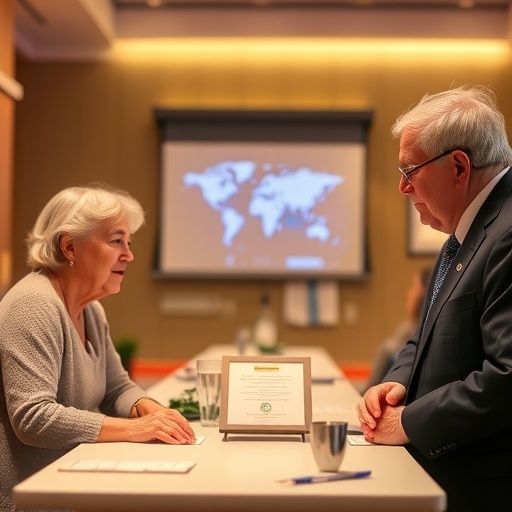In an era where the aging global population demands increasingly nuanced understandings of senior health, a groundbreaking study by researchers at Hebrew SeniorLife has unveiled compelling evidence linking ambient home temperature to cognitive function in older adults. This pioneering observational study, which recently garnered the prestigious Mather Institute Bronze Award in its 2025 Innovative Research on Aging Awards, sheds new light on environmental factors critical to mental acuity among seniors aging in place.
The research team, helmed by Amir Baniassadi, PhD, assistant scientist at the Hinda and Arthur Marcus Institute for Aging Research, meticulously tracked 47 community-dwelling older adults residing in the Boston area. Participants, averaging 79 years of age, engaged in bi-daily self-reporting over a period extending up to twelve months, detailing their perceived attentional capacity alongside thermal comfort levels. Meanwhile, investigators employed sophisticated smart sensors to continuously monitor ambient temperature and relative humidity within participants’ homes, enabling an unprecedented longitudinal dataset linking environmental conditions to cognitive self-assessment.
Analysis unveiled a pronounced U-shaped association between home ambient temperature and participants’ reported difficulties with maintaining attention. Optimal attention corresponded to indoor temperatures ranging from 20°C (68°F) to 24°C (75.2°F), with cognitive performance declining when temperatures deviated beyond this envelope. Notably, even modest shifts of 4°C in either direction doubling the odds of attention difficulty highlight the sensitivity of older adults’ cognitive function to subtle environmental fluctuations. These findings emphasize the intricate biophysiological interplay between thermal conditions and neurocognitive processes in aging populations.
The study’s methodology is anchored in continuous real-world monitoring, transcending traditional episodic assessments typically reliant on laboratory or clinical environments. Such ecological validity enhances the relevance of findings for practical application in senior living contexts. By coupling subjective self-reports with objective environmental data, the research elegantly captures the dynamic, lived experience of cognitive challenges as modulated by ambient climate factors within private dwellings.
Published in the Journal of Gerontology: Medical Sciences under the title “Home Ambient Temperature and Self-reported Attention in Community-Dwelling Older Adults,” this investigation marks a significant advancement in gerontological research. It bridges the gap between environmental gerontology and cognitive neuroscience, revealing how microenvironmental conditions directly influence seniors’ capacity for sustained attention—a cognitive domain tightly intertwined with everyday functional independence and quality of life.
Senior cognitive function is a multifactorial phenomenon influenced by physiological, psychological, and environmental determinants. The novel contribution of Baniassadi and colleagues lies in quantifying the impact of one such modifiable factor: indoor temperature. This nuanced insight paves the way for innovative interventions potentially mitigating cognitive decline risk through environmental optimization, which is especially pertinent as aging in place becomes a preferred alternative to institutional care.
The implications of temperature-induced cognitive fluctuations extend into the design, management, and policy frameworks underpinning senior living facilities and home care. This research substantiates the need for integrating precise climate-control technologies and individualized comfort strategies to foster optimal cognitive environments. Furthermore, these insights reinforce the imperative for public health messaging and support systems targeting thermal comfort maintenance as a means to preserve attentional faculties in older adults.
Jennifer L. Smith, PhD, assistant vice president and director of the Mather Institute, underscored the practical significance of this research. She emphasized that understanding how home ambient temperature affects seniors’ attentional capacity during daily activities holds transformative potential for the senior living industry. The award from the Mather Institute not only celebrates scientific excellence but also catalyzes translational efforts to embed research findings into smarter, evidence-driven aging services and supportive living environments.
Moreover, this study offers a clarion call to researchers and practitioners alike to deepen explorations of the sensory and environmental substrates influencing cognition in later life. The intersection of ambient climate monitoring with continuous cognitive assessment represents a methodological template from which future research can extrapolate broader paradigms, including the integration of artificial intelligence and home automation systems to create adaptive thermal environments.
Hebrew SeniorLife’s role, anchored as a Harvard Medical School affiliate and a leader in senior care innovation, validates the study’s robustness and translational potential. The Hinda and Arthur Marcus Institute for Aging Research, the investigatory arm of Hebrew SeniorLife, boasts one of the nation’s largest portfolios in clinical gerontology research. The institute’s commitment to unraveling age-related disease mechanisms and optimizing health trajectories underscores the present study’s impact within a larger continuum aimed at enhancing longevity and cognitive vitality.
The study’s precision in capturing the thermoregulatory milieu’s effects complements existing literature on temperature-related physiological stressors in older adults, such as cardiovascular strain and sleep disruption, while extending the conversation into cognitive resilience and vulnerability. It calls attention to the critical need for maintaining environmental homeostasis as a pillar of holistic elder care and underscores how even modest environmental perturbations can propagate cognitive deficits.
In summary, this award-winning research pioneers an essential dialogue on the convergence of gerontology, environmental science, and cognitive psychology. It invites health professionals, caregivers, and policymakers to reimagine the elder home environment as a dynamic determinant of mental acuity, advocating for nuanced climate management as a feasible, cost-effective modality to safeguard attention and promote successful aging in the comfort of one’s own home.
Subject of Research: Impact of home ambient temperature on cognitive function in older adults.
Article Title: Home Ambient Temperature and Self-reported Attention in Community-Dwelling Older Adults.
News Publication Date: 2025.
Web References:
Hebrew SeniorLife news article: https://www.hebrewseniorlife.org/news/new-study-links-home-temperature-cognitive-function-older-adults
Mather Institute Innovative Research on Aging Awards: https://www.matherinstitute.com/award-programs/innovative-research-awards/
Journal of Gerontology: Medical Sciences publication: https://pubmed.ncbi.nlm.nih.gov/39656181/
Keywords: Gerontology, Older adults, Cognitive function, Ambient temperature, Aging in place, Environmental gerontology, Attention, Senior living, Aging research.
Tags: aging population studiesambient temperature effects on cognitioncognitive function and room temperaturecognitive self-assessment in agingenvironmental factors in agingHebrew SeniorLife studylongitudinal study on cognitive performanceMather Institute Bronze Awardmental acuity in older adultsobservational study on seniorssenior health researchthermal comfort and attention





